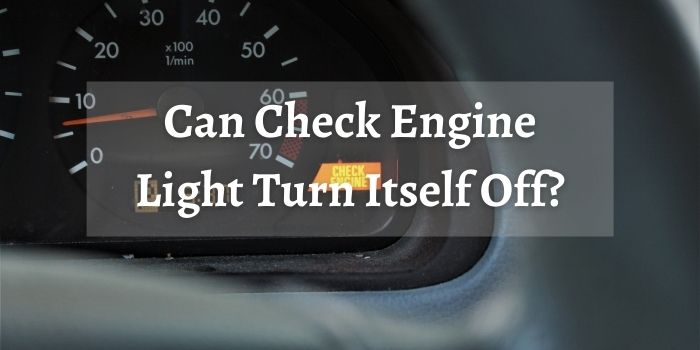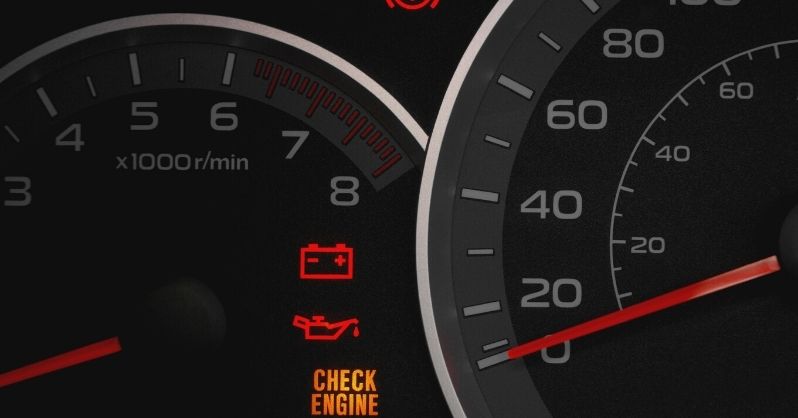No one wants to deal with a malfunctioning car, and the last thing you want to worry about is a check engine light. So can check engine light turn itself off? In most cases, yes – but there are a few things you should know first.
In this post, we’ll talk about what might cause your check engine light to turn on and what you can do to make it go off again. So, pull up a chair and keep reading!

Can Check Engine Light Turn Itself Off?
The check engine light is one of the most important indicators in your car. It can tell you when there’s something wrong with your engine, or it can let you know that something needs to be checked with engine codes like $7E9 And $7E8.
But what happens when the check engine light turns itself off? Is it safe to ignore it, or should you still take your car to the mechanic?
In most cases, it’s safe to assume that the check engine light has turned itself off because the problem has been fixed. However, there are a few exceptions to this rule. If the check engine light comes on and then goes off immediately, it could be a sign that there’s a loose connection in the electrical system.
This is usually nothing to worry about, but it’s always best to get it checked out by a professional just to be safe.
Additionally, if the check engine light turns off and then comes back on within a few days, there could be an issue with the sensor that needs to be replaced.
Is It Safe To Drive With Check Engine Light On?
Check engine lights are one of the most frustrating things that can happen to a driver. Not only are they annoying, but they can also be confusing and cause stress. The good news is that in most cases, it is safe to drive with the check engine light on.
However, there are a few things you should keep in mind if you find yourself in this situation. First, it’s important to understand what the check engine light actually means.
In most cases, it indicates that there is an issue with the emissions system.
Second, even if the problem is minor, it’s always best to get it checked quickly.
Finally, if the check engine light is accompanied by other warning lights, such as the oil pressure light, it’s best to pull over and call for assistance. Driving with any type of warning light on is never a good idea.
Why Does The Check Engine Light Turn Itself Off?
The Check Engine light is designed to inform the driver that there is an issue with the vehicle. In most cases, the light will often turn itself off after a few driving cycles.
This is because the computer system is designed to run periodic checks when the engine is first turned on. If the problem persists, the light will stay on until it is fixed. But if the problem is fixed- the light will turn itself off.
Most Common Codes Check Engine Light

Your check engine light comes on, but what does it mean? There are a variety of reasons the light can come on, and some are more serious than others. Here are some of the most common codes that will trigger a check engine light:
Oxygen sensor code
The oxygen sensor is located in the exhaust system and monitors the level of oxygen in the exhaust. If the sensor senses that the air-fuel mixture is too rich or too lean, it will send a signal to the computer to adjust the fuel mixture.
A faulty oxygen sensor can cause poor fuel economy and increased emissions. In some cases, it can also cause the Engine Light to come on. If you see this code, it’s important to have your car checked by a mechanic as soon as possible.
Engine Misfire Code
One of the most common error codes that cause the check engine light to come on is code P0304, which indicates an engine misfire in cylinder 4.
Cylinder 4 is typically the second cylinder from the front on the driver’s side of the engine, and an engine misfire can be caused by a variety of issues, including a spark plug that has gone bad, a dirty air filter, or a fuel injector that is not functioning properly.
Evaporative system codes
These codes indicate that there is a problem with the system that allows fuel vapors to be drawn into the engine during the combustion process.
The most common problems that can cause these codes to be triggered include a faulty gas cap, a leaking hose, or a clogged filter. In some cases, simply tightening or replacing the gas cap can resolve the issue.
Catalytic Converter Code
This code indicates that the catalytic converter isn’t converting exhaust gases into less harmful substances as efficiently as it should be.
There are a number of reasons why this might happen, including a clogged converter, failed oxygen sensors, or a fuel mixture that’s too rich or too lean. In most cases, code P0420 can be fixed by simply replacing the catalytic converter.
Can I Diagnose The Problem Myself?
Many drivers have probably experienced the dreaded “check engine” light coming on at some point.
While it can be tempting to ignore the problem or try to diagnose it yourself, it’s important to remember that the check engine light is there for a reason.
The best way to diagnose a check engine light is to use an OBD scanner. This will give you a code that you can take to a mechanic to help them identify the problem.
Trying to diagnose the problem yourself without this code is difficult and not worth the risk. So, if your check engine light comes on, don’t ignore it, get an OBD scanner and take it to a mechanic!
FAQs
1. Check engine light went off after a week?
A check engine light is a warning that something is wrong with your car’s engine. If the check engine light comes on and stays on for a week, you should take your car to a mechanic to have it checked out.
Depending on what the problem is, it may need to be repaired right away. Ignoring a check engine light can lead to further damage to your car’s engine!
2. How Long Does It Take For Check Engine Light To Go Off?
There’s no specific time limit for the light to go off. It’s important to keep in mind that not all check engine light problems are serious. In fact, many times the light will come on simply because of something loose or a small problem.
The good news is that in most cases, the light will go off on its own once the problem is fixed. However, if the light stays on for more than a day or two, it’s best to take your car to a mechanic to have it checked out.
Conclusion
If you’re like most people, the check engine light on your car is probably one of those things that you ignore until it becomes a bigger problem. And if you’re lucky, the light will eventually turn itself off and you can go back to pretending it doesn’t exist.
So next time your car’s check engine light comes on, don’t panic just yet – try waiting it out and see if it goes away on its own. Worst case scenario? You take it in for a diagnostic and find out what’s really wrong with your vehicle.